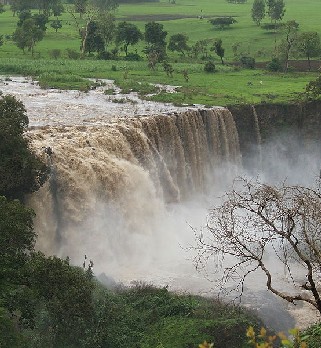|
Egypt | Ethiopia | Sudan | Uganda Economy - Development | Politics | Environment - Nature Nile water resource dispute splits region
The countries of the Nile Basin have negotiated for 13 years to reach a new agreement regulating the use of Nile waters. The deal was to replace previous agreements, from 1929 and 1959, that give Egypt and Sudan control over about 90 percent of the Nile's water and was seen as a colonial relic unfavourable to upstream nations.
Ethiopia, a country regularly experiencing droughts and famines, has been the main propagator of a new Nile Basin agreement, pointing to the fact that the country is strongly under-developed and needy in terms of water and electricity developments. Ethiopia and Egypt have a rivalry going back centuries, with officials in Cairo and Addis Ababa highly suspicious of each other. Ethiopian Prime Minister Meles Zenawi did not ease tensions with Egypt as he chose the day of the Entebbe agreement to coincide with the prestigious inauguration of the large Beles Hydroelectric Power Project today. The Beles project represents the major dam on the Blue Nile near Lake Tana, strongly influencing the waters of the Nile. According to Mihiret Debebe of the Ethiopian Electric Power Corporation, the Beles power plant has a capacity to generate 460 megawatts and is the largest of the power plants so far constructed in the country. One of the four turbines of the project has already begun generating 115 megawatts, with the plant going fully operational in the coming two months. "The project will raise existing electric power supply by 30 percent," Mr Mihiret said. The prestigious Beles project however has further aims. Project manager Kifle Horo says that, "as Beles is a multipurpose project, the water that comes out after producing electric power will be used to develop over 140,000 hectares of land." These are waters that not will be reaching Sudan and Egypt from now on. During today's inauguration, Prime Minister Zenawi said the completion of this new US$ 500 million dam, built without any donor support, "marks the realisation of Ethiopia's hundred years of effort to utilise its resource on the Nile." With the new Nile waters agreement sealed - although not signed by Egypt - Ethiopia plans to go forward with its plans to develop its rich hydroelectric resources to boost economic and social development in the country. The aim is a national power production of 5,000 to 8,000 megawatts, PM Zenawi revealed. This will inevitably increase tensions with Cairo and Khartoum. By staff writers © afrol News - Create an e-mail alert for Egypt news - Create an e-mail alert for Ethiopia news - Create an e-mail alert for Sudan news - Create an e-mail alert for Uganda news - Create an e-mail alert for Economy - Development news - Create an e-mail alert for Politics news - Create an e-mail alert for Environment - Nature news
On the Afrol News front page now
|
front page
| news
| countries
| archive
| currencies
| news alerts login
| about afrol News
| contact
| advertise
| español
©
afrol News.
Reproducing or buying afrol News' articles.
You can contact us at mail@afrol.com









